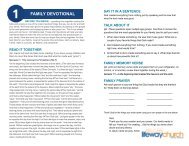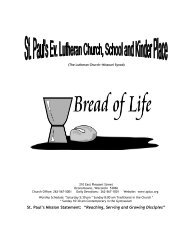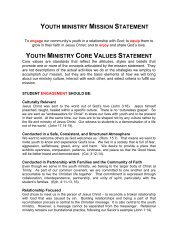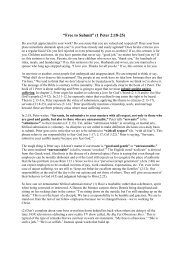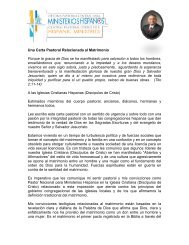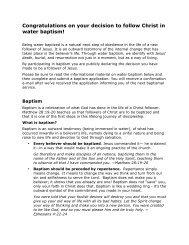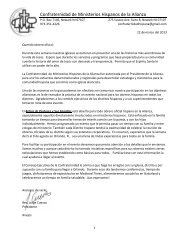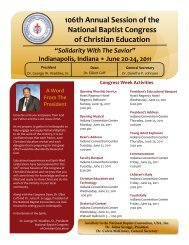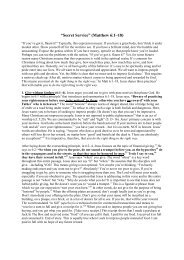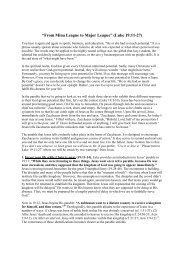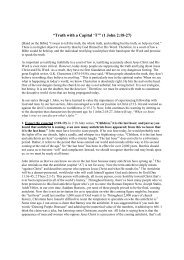A Proposal to Reduce Unnecessary Divorce - Razorplanet
A Proposal to Reduce Unnecessary Divorce - Razorplanet
A Proposal to Reduce Unnecessary Divorce - Razorplanet
You also want an ePaper? Increase the reach of your titles
YUMPU automatically turns print PDFs into web optimized ePapers that Google loves.
34. Mike McManus, How <strong>to</strong> Cut America’s <strong>Divorce</strong> Rate in Half…A Strategy Every<br />
State Should Adopt (Po<strong>to</strong>mac, MD: Marriage Savers, Inc., 2008).<br />
35. Linda J. Waite et al., Does <strong>Divorce</strong> Make People Happy? Findings from a Study<br />
of Unhappy Marriages (New York: Institute for American Values, 2002), http://www.<br />
americanvalues.org/UnhappyMarriages.pdf.<br />
36. The first author of this report is a marriage and family therapist with decades<br />
of experience as a counselor, teacher, and trainer of marriage counselors. He believes<br />
that marriage counseling when done well can be a good, healing modality for marriages,<br />
but that <strong>to</strong>o often it is not done well.<br />
37. William J. Doherty, “How Therapists Harm Marriages and What We Can Do<br />
about It,” Journal of Couples & Relationship Therapy 1, no. 2 (2002): 1–17. Licensed<br />
psychologists, counselors, psychiatrists, and clinical social workers have no required<br />
coursework or training in marriage counseling. Licensed marriage and family therapists<br />
have required coursework, but no clinical experience requirements in working with<br />
couples per se; state licensing requirements refer <strong>to</strong> working with “relational units,”<br />
which can mean parents and children. Although in practice marriage and family therapists<br />
are more likely than other licensed professionals <strong>to</strong> have experience in marriage<br />
counseling, some have little experience.<br />
38. John Wall et al., “The Ethics of Relationality: The Moral Views of Therapists Engaged<br />
in Marital and Family Therapy,” Family Relations 48, no. 2 (April 1999): 139–49.<br />
39. Poll conducted by random digit telephone techniques of 384 married Minnesotans<br />
in 2000.<br />
40. For an alternative approach, see Michele Weiner-Davis, The <strong>Divorce</strong> Remedy:<br />
The Proven 7-Step Program for Saving Your Marriage (New York: Simon & Schuster,<br />
2001); and William J. Doherty, “Couples on the Brink: S<strong>to</strong>pping the Marriage-Go-<br />
Round,” Psychotherapy Networker (March/April 2006): 30–39, 70. Even among experienced<br />
marriage therapists who want <strong>to</strong> help couples reconcile if this can be done<br />
without risk for either spouse (a pro-commitment stance), many lack adequate ways<br />
<strong>to</strong> manage the familiar scenario when one spouse wants <strong>to</strong> save the marriage and the<br />
other is leaning <strong>to</strong>wards divorce. They either hold back from helping the marriage because<br />
one spouse is resistant, or they side with the more committed spouse and alienate<br />
the ambivalent one. Even the major evidence-based models of couples therapy are<br />
not particularly useful in this situation, because they are based on studies that require<br />
both partners <strong>to</strong> be interested in working on the relationship.<br />
41. An exception is pas<strong>to</strong>ral counselors credentialed by the American Association<br />
of Pas<strong>to</strong>ral Counselors, who have high levels of training, although not necessarily in<br />
marriage counseling per se.<br />
55



